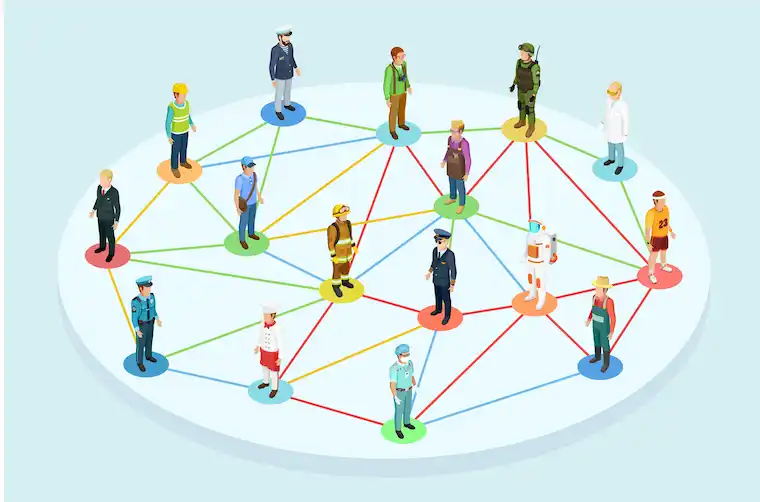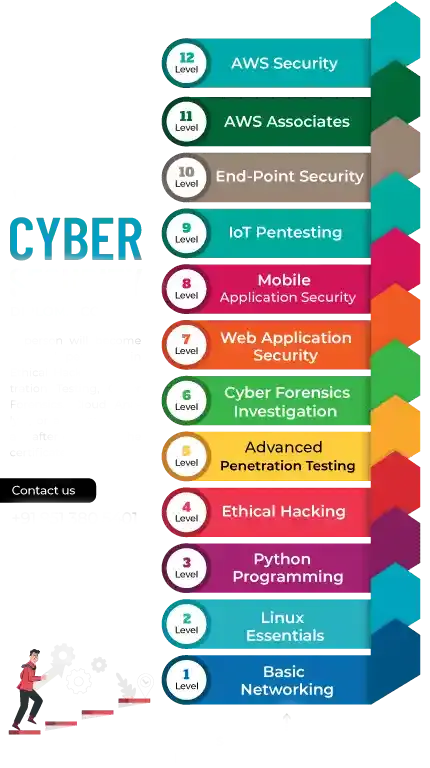A Comprehensive Guide to Networking Course and Certification

A Comprehensive Guide to Networking Course and Certification
Introduction: Networking Course and Certification
The importance of networking in the digital age cannot be emphasized. The capacity to communicate effectively and securely, share data, and gain access to resources has become crucial as the globe becomes more interconnected. Business paradigms, educational paradigms, and even interpersonal connections have all been altered by this digital connectivity. The complex network of connections, however, that makes this worldwide communication possible requires the expertise of competent people in order to be kept up.
As a result, there is a rising need for networking experts. As network-dependent technologies like IoT and cloud computing continue to advance and cyber risks increase, the responsibility of these specialists has changed from only establishing connections to guaranteeing strong, secure, and scalable network infrastructures.
As businesses and people depend increasingly on digital platforms, networking specialists’ skills become not merely important but crucial to the smooth running of our digital lives.
What is Computer Networking?
The process of interconnecting various computing devices in order to exchange data, resources, and services is known as computer networking. This link, whether wired or wireless, enables data interchange between devices over a range of distances, from within a single room to the entire world. The Internet, which is one of the biggest and most useful networks, is a good illustration of how useful and far-reaching computer networking is.

Basic Networking Concepts
Fundamental ideas that allow efficient and organized interaction among devices are at the heart of networking. This includes subnets, which divide a bigger network into manageable portions, IP addresses, which distinguish between devices on a network; protocols, which are a collection of rules regulating data exchange; routers, and switches, which assist in guiding data to its intended location. A network’s range and scope are further defined by the distinction between LAN (Local Area Network) and WAN (Wide Area Network). To fully appreciate the complexities of networking, it is essential to comprehend these fundamental concepts.
The Role of a Networking Professional
In the process of building, setting up, operating, and troubleshooting computer networks, a networking expert is essential. Their knowledge guarantees secure networks, accurate data, and seamless communication. Networking experts must constantly refresh their abilities due to the wide variety of technologies available and the quick speed of innovations in the area.
In fields like network administration, architecture, security, or wireless technology, they frequently specialize. Beyond only having technical knowledge, they are also accountable for comprehending the unique requirements of enterprises or organizations in order to create networks that support those entities’ expansion strategies.
The Need for Networking Certification
- Advantages of Networking Certification
A person’s expertise and understanding in the discipline of networking can be demonstrated in concrete ways with the help of networking certification. Having such a certification can increase credibility by demonstrating to potential employers or clients that a person is skilled in a certain area of networking. The latest trends, technology, and best practices in the business are frequently introduced to professionals who are looking for certification, guaranteeing that they stay current and competitive. In addition, numerous credentials grant exclusive access to databases, communities, and other platforms that are helpful for networking with peers and pursuing ongoing education.
- How Networking Certification Enhances Your Career
Having an accreditation might make you stand out significantly in the cutthroat world of networking and IT. It can be a competitive advantage for job seekers, demonstrating their commitment to lifelong learning and their passion for their field. Certifications are frequently used by employers as a quick way to evaluate a candidate’s skills and expertise.
Moreover, a number of studies have shown that professionals who hold credentials typically make more money than their non-certified colleagues. Getting networking certifications can further one’s career by providing access to specialized positions, promotions, and even prospects for work as consultants or trainers.

Networking Courses and Certifications Overview
- Types of Networking Courses and Certifications
There are numerous courses and certifications available in the field of networking and IT that are geared toward professionals of all experience levels. Such programs are created to provide students with the knowledge and abilities to plan, develop, maintain, and troubleshoot networks while keeping them up to date with emerging technologies. The corresponding certifications act as verifiable evidence of a person’s proficiency and understanding in a particular area of networking.
- Understanding CompTIA Network+ Certification
A core qualification for anyone beginning their career in networking is CompTIA Network+. Network technology, setting up and configuring networks, media, and topologies, and management of networks are just a few of the initial subjects it covers. The Network+ certification is a wonderful first step for prospective networking professionals because it attests to one’s comprehension of these fundamentals.
- Cisco Certified Network Associate (CCNA) Certification
One of the most prestigious and regarded qualifications in the networking sector is the CCNA credential, which is provided by Cisco. It dives further into networking theories and methods, especially those connected to Cisco goods and services. The capacity to install, configure, run, and debug medium-sized routed and switched networks is demonstrated by obtaining a CCNA certification.
- Other Noteworthy Certifications: Juniper Networks, Microsoft, Google
Other well-known organizations that provide worthwhile credentials exist in addition to CompTIA and Cisco. As an example, Juniper Networks offers certifications centered on its network services and goods. The Microsoft Certified: Azure Network Engineer Associate credential highlights knowledge in the Azure networking field. With its Professional Collaboration Engineer certification, Google has also entered the certification market while putting an emphasis on abilities linked to Google Workspace’s key services.
Each of these credentials specializes in a particular area within the broad subject of networking, enabling individuals to focus on topics that most closely match their professional goals.

Choosing the Right Networking Course
- Factors to Consider When Choosing a Networking Course
To ensure an effective learning experience, it’s important to assess a number of important elements while choosing a Networking course. Determine your present level of knowledge and the goals you have, such as gaining core information or developing a specialized area of expertise. Secondly, carefully review the course syllabus to be sure it includes the subjects you’re eager to learn about. Other factors to think about include the duration of the course, the course mentor’s experience, and learner reviews.
Last but not least, you should consider the expense of the course and its possible return on investment in terms of job growth.
- Online vs. In-Person Courses: Weighing the Pros and Cons
Online courses are increasingly popular in the digital era, but both of these delivery methods offer specific benefits and drawbacks. Online courses give students flexibility because they let them access the content whenever it’s convenient for them and frequently at their own speed. They are especially useful for people who balance work and school or who live in rural places. However, they necessitate self-control and cannot provide the practical experience that some students yearn for. On the other hand, face-to-face classes offer quick feedback, face-to-face interaction with lecturers, and frequent practical exercises. Although the organized environment might help students concentrate, these courses often have more rigid schedules and may require commuting.
- Recommendations for Reputable Networking Courses
It’s always wise to start with organizations that are acknowledged within the business while looking for trustworthy networking courses. The Network+ course from CompTIA and the CCNA and CCNP programs from Cisco are both highly regarded. Microsoft Azure and Google Cloud courses are notable for individuals researching cloud networking. Additionally, a variety of networking-related courses are available on websites like Coursera, Udemy, and LinkedIn Learning that are taught by seasoned industry experts. Before enrolling in a course, read reviews, get referrals from professionals in the field, and possibly test out a few courses (if that’s possible).
Diving into Networking Course Content
- Key Topics Covered in Networking Courses
Network awareness and expertise are built on a variety of topics that are commonly covered in networking programs. The fundamentals of networking, network topologies, procedures, IP addressing, subnetting, routing and switching, network security, wireless technologies, and troubleshooting methods are a few examples of what may be covered. Specific topics like cloud networking, virtualization, network automation, and cybersecurity may be covered in more advanced courses.
- Practical Skills and Hands-On Training
Practical knowledge is the foundation of network learning, and practical experience is frequently an essential part of networking programs. Learners can more easily apply theoretical ideas in the actual world thanks to this training. In addition, learners can configure, diagnose, and administer networks using simulation tools or real hardware and software. Moreover, students gain confidence as a result of this experiential learning, which also gets them ready for the difficulties they’ll face in the world of networking.
- The Importance of Lab Work in Networking Courses
In the study of networking, lab work is essential. By offering a secure setting where learners can practice, explore, and learn through mistakes without endangering actual network systems, it supports theoretical training. Participants can envision complex networking processes and comprehend the nuances of network configuration and maintenance thanks to the immersive experience provided by lab work.
These labs frequently simulate real-world situations, encouraging the development of critical thinking and problem-solving abilities necessary for a lucrative career in networking. Many academics and industry experts stress the need for lab work as an essential part of a thorough networking education.
Study Materials and Resources for Networking Certification
- Essential Books for Networking Certification
For people pursuing networking certifications, books have long been a crucial component of their study plans. They provide comprehensive insights and organized instruction and frequently originate from well-known certifying agencies or subject-matter authorities. For CCNA and CCNP candidates, for instance, Cisco’s official certification manuals are strongly advised. Similar to this, Todd Lammle’s”CompTIA Network+ Study Guide” offers thorough coverage of the Network+ exam. Books are essential for full preparation because they not only lay out the main ideas but also provide practice questions, real-world examples, and troubleshooting procedures.
- Online Resources for Self-Study
A wealth of online resources geared toward networking learners have emerged with the advent of the digital age. A variety of courses, video lectures, and mock tests are available on websites like Cisco’s Learning Network, forums like TechExams.net, and platforms like Udemy, Coursera, and Pluralsight. These tools make it possible to take a more flexible and interactive approach to learning. Community forums and discussion groups can also be quite helpful because they offer peer support, explanations, and shared knowledge that is helpful throughout the certification process.
- Utilizing Networking Simulators and Software Tools
Networking simulators and software tools are essential for hands-on experience, particularly when physical networking equipment is not available. Learners can reproduce and visualize network settings, debug problems, and comprehend complicated networking situations in a lab setting using tools like Cisco’s Packet Tracer or the more sophisticated GNS3. Both certification tests and real-world networking activities require practical expertise, which these platforms provide as a risk-free environment for experimentation, understanding errors, and information acquisition.

Preparation Strategies for Networking Certification Exams
- Creating an Effective Study Plan
An efficient study plan is the cornerstone of the systematic strategy needed to begin the road toward a networking certification. Start by comprehending the certification exam’s parameters and framework. According to the complexity of each topic and your past knowledge, allot certain time blocks for it. Make sure to include breaks and review times in your goal-setting process. In addition to keeping you on track, a well-structured plan guarantees that each subject is covered in detail, avoiding the need for last-minute cramming and guaranteeing an improved balanced preparation.
- Balancing Theoretical Learning with Practical Application
Although academic knowledge is the foundation of every certification, networking is fundamentally a practical industry. Therefore, finding an appropriate equilibrium between the two is crucial. You should supplement the ideas you learn from books and lectures with practical experience, whether it is on real equipment or a simulator. This duality guarantees solid comprehension, helps with retention, and inspires confidence. Complicated topics become more understandable when theory is put into practice in real-world situations, and students can gain a more comprehensive understanding of networking’s subtleties.
- The Role of Practice Exams in Your Study Routine
Practice tests are essential resources for certification preparation. They offer a preview of the actual exam, allowing you to assess your preparedness. By performing these exams frequently, you can spot problem areas that require more attention. Additionally, they help you become accustomed to the exam’s structure, scheduling, and question style, which lowers anxiety and prepares you for a more focused and assured performance on test day. The increase in grades also acts as a motivational force as you advance in your studies, reassuring you that you’re on the correct route.
Navigating the Certification Exam
Although navigating the Certification Exam can be challenging, you can improve your chances of success with the correct tactics.
| Understanding the Exam Format | Start by fully comprehending the exam format. You can manage your time during the test by understanding the format, time constraints, and types of questions. Last-minute exam preparation is equally important. |
| Last-Minute Exam Preparation Tips | Tips for last-minute exam preparation include going over essential ideas again, practicing with practice questions, and making sure you’re well-rested. Exam anxiety can still creep in, though, even with thorough preparation. Use strategies like deep breathing, positive imagery, and present-moment attention to counteract this and keep anxiety at bay. |
| Dealing with Exam Anxiety | You can tackle the certification exam with confidence and a greater possibility of getting the results you want through using an in-depth knowledge of the exam style, efficient last-minute practice, and anxiety management techniques. |
The Journey Post-Certification
Starting the post-certification journey brings up a world of fascinating networking opportunities.
| Job Opportunities and Career Paths After Networking Certification | You can access a wide range of Job Opportunities and Career Paths that were never before possible with the help of a recognized certification. Your abilities are currently in demand across many industries, whether it be network administration, security analysis, or system architecture. |
| The Importance of Continuous Learning in Networking | It’s important to recognize the value of ongoing learning in networking, though. Considering the ongoing emergence of new technology and threats, the industry is evolving quickly. Adopting an attitude of continuous learning and skill improvement makes sure that your knowledge is current and flexible enough to adapt to the changing networking scene. |
| Next Steps: Advanced Networking Certifications | Maintain the attractiveness of Advanced Networking Certifications in mind while you decide on your next steps. With the use of these certifications, you may show that you are a specialist in a certain field, including cloud networking, wireless technologies, or advanced security methods. You can succeed in the always-changing networking industry by seizing these opportunities for advancement. |
FAQs
About A Comprehensive Guide to Networking Course and Certification
1: What are the prerequisites for enrolling in a networking course?
There are no special prerequisites for enrolling in the Basic Networking Course by Craw Security, the Best Cybersecurity Training Institute in India. You are just required to showcase a valid 10+2 passed certificate from a recognized board anywhere in India.
2: How difficult are networking certification exams?
There are certain specialized networking certification exams that are literally difficult to pass on. However, the Basic Networking Course by Craw Security can fall into the moderate category of difficult networking courses.
3: What are the potential job roles for a certified networking professional?
The potential job roles for a certified networking professional are as follows:
- Network Administrator,
- Network Engineer,
- Systems Engineer,
- Network Security Specialist,
- Network Analyst,
- Wireless Network Engineer,
- Network Consultant,
- Cloud Network Engineer,
- Network Solutions Architect,
- VoIP Engineer,
- Network Operations Center (NOC) Technician,
- Network Manager,
- Network Support Engineer, etc.
4: How much does a networking certification course typically cost?
Different institutes offer diverse price variations for their specialized networking certifications. However, at Craw Security, you will gladly receive the Basic Networking Course by highly trained and experienced training professionals at a very affordable price that is harder for you to find anywhere else.
5: What is the average salary for a certified networking professional?
The average salary for a certified networking professional can be dependent on several prominent factors like company, niche, scale, scope, location, and many more. However, the mainstream details related to the average salary for a certified networking professional are given below:
- Entry-Level Positions (0-2 years of experience): The average compensation for those beginning their professions with credentials like CompTIA Network+ or Cisco CCNA could range from about ₹2.5 lakhs to ₹5 lakhs annually.
- Mid-Level Positions (2-5 years of experience): Professionals can make an average salary of between ₹5 lakhs and ₹10 lakhs rupees per year with just a few years of expertise and possibly more specialized certifications like Cisco CCNP.
- Senior-Level Positions (5+ years of experience): Individuals with substantial expertise, specialized certificates, and perhaps in positions like network architects, security specialists, or consultants can make up to ₹20 lakhs or more annually.
6: How can I stay updated with the latest networking technologies?
Below mentioned are some effective strategies to ensure you stay current with the latest networking technologies:
- Online Resources and Forums,
- Blogs and Newsletters,
- Social Media,
- Online Courses and MOOCs,
- Vendor-Specific Resources,
- Certification Programs
- Technology Conferences and Seminars,
- Webinars and Virtual Events,
- Networking User Groups,
- Experiment and Lab, and many more.
7: What is the validity of networking certification, and when does it need to be renewed?
The networking certifications that are taken from the House of CISCO Technologies are available for a time period of 3 years. However, the Basic Networking Course by Craw Security, offered by highly trained and skilled training professionals, is a certification that comes with a long-lasting limitless validity once you win this certification after taking the concerned examination.
Conclusion
In the bottom line, we would like to say that we have tried our best to elaborate on the comprehensive guide to networking courses and certification from varied networking supergiants, including CISCO Technologies, CompTIA Technologies, Craw Security, and many more.
For a better understanding of networking concepts, you may join Craw Security’s world-class Basic Networking Course facilitated by highly experienced networking mentors with years of quality expertise. To know more about the same, give us a call at our hotline mobile number +91-9513805401.


















